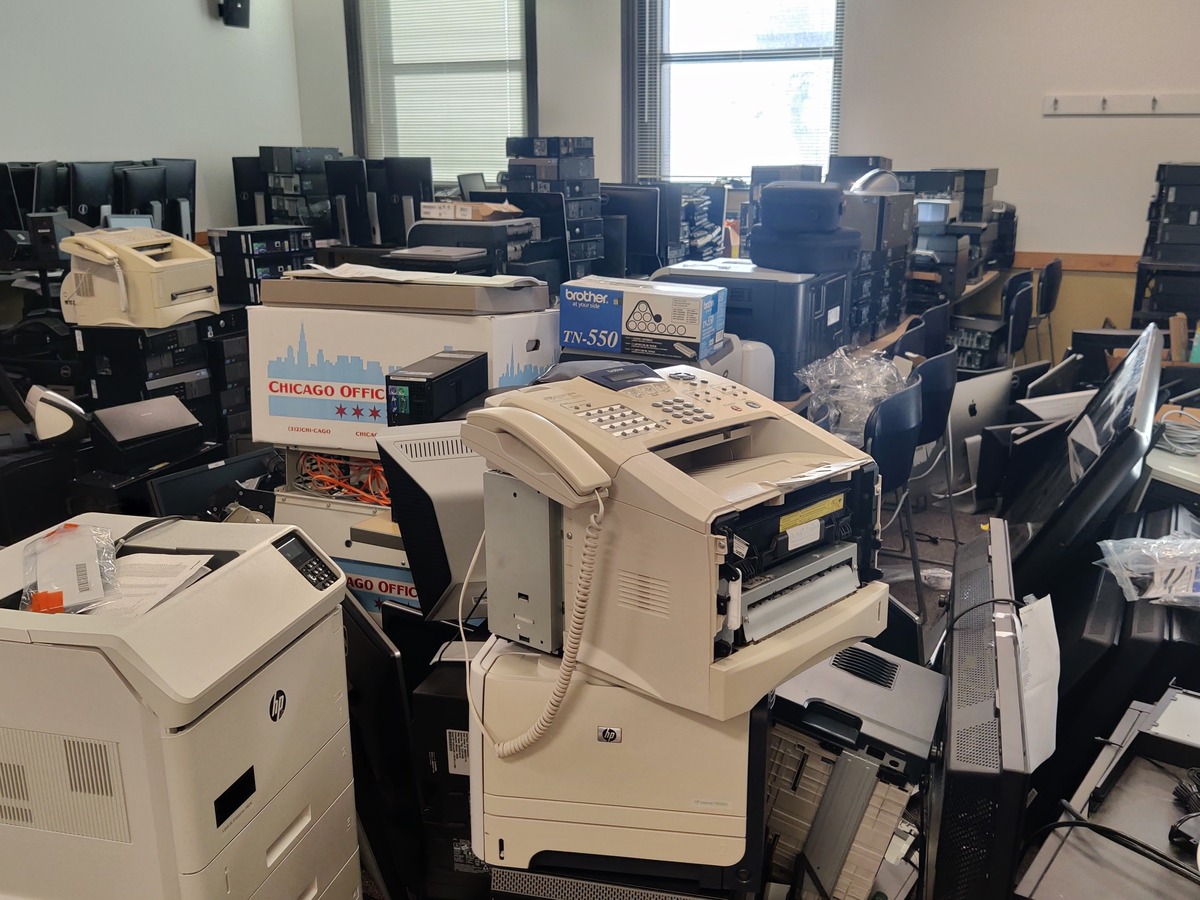 Photo by Aubreonna Chamberlain/DePaul University In fall 2024, university departments across DePaul uncovered 36,000 pounds of unused computers and other technological equipment collecting dust in empty offices.
Photo by Aubreonna Chamberlain/DePaul University In fall 2024, university departments across DePaul uncovered 36,000 pounds of unused computers and other technological equipment collecting dust in empty offices. Faced with an overwhelming amount of retired technology, DePaul’s Procurement Services department, in collaboration with Information Services, launched a tech salvage program to safely and sustainably recycle and reuse the technology.
Tom Longo, director of Financial Services and Procurement, co-led the tech salvage program with the support of student workers and professional staff in Procurement, Facility Operations, Information Services and the Jarvis College of Computing and Digital Media. The goal of the program was to minimize waste and maximize the value of equipment, Longo says.
The collected equipment was delivered to the Chicagoland nonprofit PCs for People. The organization provides affordable, refurbished devices and internet for low-income individuals, families and nonprofits. Longo says that the organization managed the recycling process, transporting the technology and securely wiping data from old computers. Non-functional or unusable parts were deconstructed and recycled in according to the organization’s “no landfill” policy.
 Last year's program collected items from monitors and scanners to computers and loose wires. (Photo from Tom Longo)“PCs for People identified that we repurposed 36,000 pounds of equipment and saved 252 metric tons of carbon dioxide from the atmosphere,” Longo says of the equipment spared from landfill. “That’s equivalent to the annual emissions of 54 passenger cars or burning nearly 7,500 gallons of gasoline.”
Last year's program collected items from monitors and scanners to computers and loose wires. (Photo from Tom Longo)“PCs for People identified that we repurposed 36,000 pounds of equipment and saved 252 metric tons of carbon dioxide from the atmosphere,” Longo says of the equipment spared from landfill. “That’s equivalent to the annual emissions of 54 passenger cars or burning nearly 7,500 gallons of gasoline.” The social impact of the tech salvage program reflects DePaul’s mission and alleviates what Longo calls a “digital divide” in access to technology. He says this divide represents barriers that make technology and education less accessible for communities with limited economic resources.
“Through the tech salvage program, DePaul provides affordable access to these digital tools,” Longo says. “This then supports our local communities’ economic development and digital literacy skills while also reducing electronic waste.”
Fifty-one DePaul departments dropped off technology at the Loop and Lincoln Park campuses, donating more than 1,100 computers, 400 monitors and various scanners, mobile phones and fax machines. Departments also came across unique devices like 3D printers and an embroidery machine. This cross-departmental initiative took just one month, with IS and FO also playing crucial roles.
Longo coordinated equipment collection and loading across departments. FO managed access to collection spaces and loading docks to facilitate offloading equipment to PCs for People. IS provided guidelines for documenting the donated equipment, removing items from DePaul’s network safely.
“The teamwork behind the tech salvage program was essential to the program’s success,” Longo says. “I’m grateful I was able to help foster this collaboration that benefited the environment, local communities and DePaul.”
The Procurement Office and Information Services look forward to introducing the tech salvage program again in April in tandem with Earth Day.
The next drop off event will take place April 21-25, 12-4 p.m. in room 250 of the O’Connell building in Lincoln Park and room 1405 of the Lewis center in the Loop.
For more information on Sustainability at DePaul and, visit sustainability.depaul.edu.